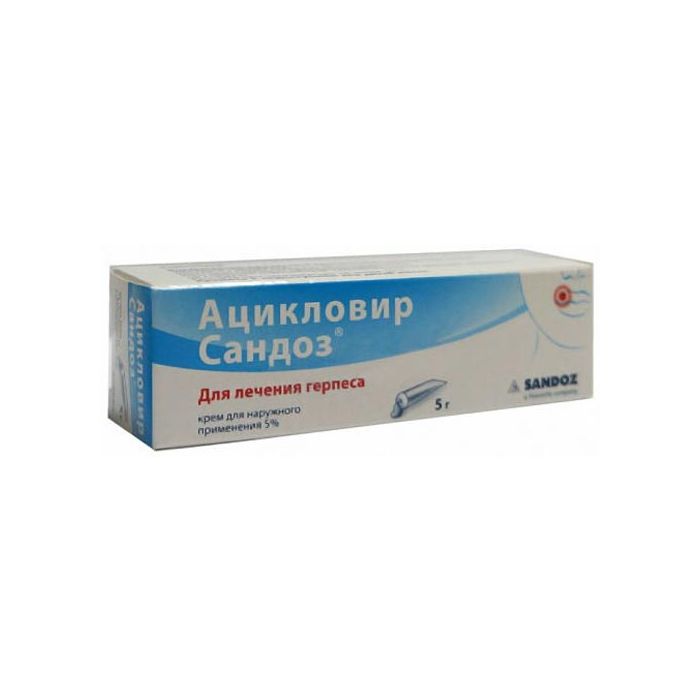Acyclovir Sandoz cream d / nar. approx. 5% tube 5
Release form, composition and packaging
Cream for external use, white or almost white, homogeneous.
100 g
acyclovir 5.0 g
macrogol and fatty acid ester (arlaton 983S) - 5.0 g, dimethicone 350 - 0.3 g, cetyl alcohol - 1.5 g, white petrolatum - 9.0 g, liquid paraffin - 5.0 g, propylene glycol - 15.0 g, purified water - 59.2 g.
2 g - aluminum tubes (1) - cardboard packs.
5 g - aluminum tubes (1) - cardboard packs.
5 g - aluminum tubes (4) - cardboard packs.
pharmachologic effect
Antiviral drug for external use.
Acyclovir is active against Herpes simplex types 1 and 2, Varicella zoster virus, Epstein-Barr virus and cytomegalovirus.
Thymidine kinase of cells infected with a virus through a series of consecutive reactions actively converts acyclovir to mono-, di- and acyclovir triphosphate.
The latter interacts with viral DNA polymerase and is embedded in DNA, which is synthesized for new viruses.
Thus, defective" viral DNA is formed, which leads to suppression of replication of new generations of viruses.
Pharmacokinetics
Suction
When used topically, it is practically not absorbed through intact skin, it is not detected in blood and urine.
When applied to affected skin, absorption is moderate.
Withdrawal
It is excreted by the kidneys (up to 9.4% of the daily dose).
In patients with normal renal function, the concentration of acyclovir in the blood serum is up to 0.28 μg / ml.
Pharmacokinetics in special clinical situations
In patients with chronic renal failure, the concentration of acyclovir in the blood serum is up to 0.78 μg / ml.
Indications for use
- skin infections caused by the Herpes simplex virus types 1 and 2, including genital herpes and herpes of the lips
- shingles
- chickenpox.
Contraindications for use
- hypersensitivity to acyclovir and other components of the drug
The drug should be prescribed with caution during pregnancy, lactation, dehydration, renal failure.
Dosage regimen
Outwardly.
The drug is applied 5 times / day (every 4 hours) with a thin layer on the affected and adjacent areas of the skin.
The cream is applied either with a cotton swab or with clean hands to avoid additional infection of the affected areas.
The therapy should be continued until a crust forms on the vesicles, or until they completely heal.
The duration of therapy is on average 5 days and should not exceed 10 days.
Overdose
Data on overdose of the drug Acyclovir Hexal were not provided.
Side effect
Local reactions: hyperemia, dryness, peeling of the skin
burning, inflammation upon contact with mucous membranes.
Development of allergic dermatitis is possible.
Drug interactions
When applied externally, no interactions with other drugs have been identified.
An increase in the effect is noted with the simultaneous appointment of immunostimulants.
Application during pregnancy and lactation
The drug should be prescribed with caution during pregnancy and lactation (breastfeeding).
There have been no adequate and well-controlled clinical studies of the safety of the drug during pregnancy.
Use is indicated only in cases where the intended benefit to the mother outweighs the potential risk to the fetus.
During the period of treatment, it is necessary to resolve the issue of stopping breastfeeding.
special instructions
To achieve the maximum therapeutic effect, it is necessary to start using the drug as soon as possible after the onset of infection (at the first signs of the disease - burning, itching, tingling, feeling of tension and redness).
The cream is not recommended to be applied to the mucous membranes of the mouth and eyes, because
development of pronounced local inflammation is possible.
When treating genital
Name ENG
ACICLOVIR SANDOZ
Clinical and pharmacological group
Antiviral drug for external use
ATX code
Aciclovir
Dosage
5% x 5g
Structure
100 g of cream contain: active substance: acyclovir - 5.0 g
excipients: propylene glycol - 8.0 g
liquid paraffin (liquid paraffin) - 12.0 g
cetyl alcohol - 6.0 g
macrogol 6 cetostearyl ether - 1.5 g
macrogol 25 cetostearyl ether - 1.5 g
methyl parahydroxybenzoate (methylparaben, nipagin) - 0.15 g
propyl parahydroxybenzoate (propylparaben, nipazole) - 0.05 g
purified water - up to 100.0 g.
Indications
Skin infections caused by Herpes simplex virus types 1 and 2, including genital herpes and herpes of the lips
shingles
chickenpox.
INN / Active ingredient
acyclovir
Contraindications
hypersensitivity to acyclovir and other components of the drug
The drug should be prescribed with caution during pregnancy, lactation, dehydration, renal failure.
Storage conditions and periods
At a temperature not higher than 25 degrees.
Expiration date: 4 years
Specifications
Scope of the drug
Leather
Release form
Cream
Manufacturer country
Germany
Package quantity, pcs
one
Minimum age from
3 years old
Way of introduction
On the skin
Vacation conditions
Without recipe
Brand name
Sandoz
The amount of the dosage form in the primary package
5 g
Primary packaging type
Tuba
Type of consumer packaging
Pack of cardboard
Pharmaco-therapeutic group
Antiviral agent
Anatomical and therapeutic characteristics
D06BB03 Acyclovir
Dosage form
Cream for external use
The target audience
Children
Dosage (volume) of the substance in the preparation
acyclovir 5 g
Expiration date in days
1460
Package weight, g
5
Category
:
Antibiotics
,
Antiseptics and disinfectants
,
Disinfectants
Mode of application
:
Acyclovir cream is applied to the affected surface 5 times / day (after 4 hours).
The duration of treatment is 5-10 days.
Information on technical characteristics, delivery set, country of manufacture "

